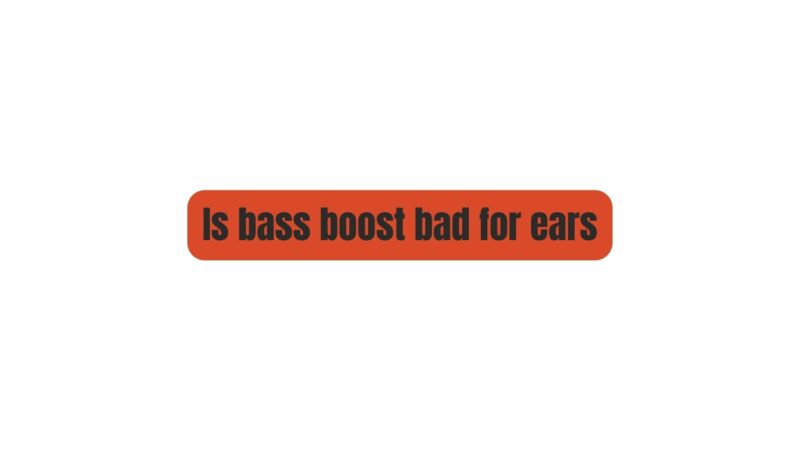Music is a universal language that transcends cultures and boundaries. Whether we’re listening to our favorite songs on headphones, at a live concert, or through a booming car stereo, the experience of music is deeply personal and often immersive. For many, enhancing the bass frequencies in their audio is a way to elevate this experience. However, the question that often arises is whether bass boost can be detrimental to our ears and hearing health. In this article, we’ll explore the relationship between bass boost and ear health, examining the potential risks and benefits.
Understanding Bass Boost
Before we dive into the effects of bass boost on our ears, let’s first establish what bass boost is and how it works.
- What Is Bass Boost?: Bass boost is a feature commonly found in audio equipment, headphones, speakers, and amplifiers. Its primary purpose is to amplify the lower frequency range of audio, typically focusing on the bass frequencies. This enhancement is achieved through various methods, including electronic equalization, signal processing, and specialized components.
- Why Use Bass Boost?: The goal of bass boost is to make the bass frequencies in music more prominent and impactful. It can bring out the deep thump of a bass drum, the rumble of explosions in movies, or the resonance of a double bass in a classical piece. Bass boost is particularly popular in genres like hip-hop, electronic dance music (EDM), and dubstep, where powerful bass lines are integral to the music.
The Potential Impact of Bass Boost on Ears
Now that we have a grasp of what bass boost is, let’s explore how it can potentially affect our ears:
- Exposure to High Sound Pressure Levels: One of the primary concerns with bass boost, especially when used with powerful audio systems, is the potential for exposure to high sound pressure levels (SPLs). Sound pressure levels are measured in decibels (dB), and prolonged exposure to high SPLs can be harmful to hearing.
- Noise-Induced Hearing Loss (NIHL): Prolonged exposure to high SPLs, whether from bass-heavy music or other loud sources, can lead to noise-induced hearing loss. NIHL is characterized by damage to the hair cells in the inner ear, which are essential for hearing. Once these cells are damaged or destroyed, hearing loss is permanent and irreversible.
- Risk of Tinnitus: Tinnitus is the perception of ringing, buzzing, or other noises in the ears when no external sound source is present. It is often associated with exposure to loud sounds and can be triggered or exacerbated by excessive bass. Tinnitus can be not only bothersome but also distressing for those who experience it.
- Excessive Vibrations: The enhanced bass frequencies produced by bass boost can create intense vibrations that are transmitted through the ear canal and into the inner ear. While this can add to the immersive experience of music, excessive vibrations can potentially cause discomfort and, in some cases, contribute to hearing fatigue.
- Threshold Shift: Listening to bass-boosted music at high volumes can lead to a temporary threshold shift (TTS), where your hearing becomes less sensitive to midrange and high-frequency sounds for a period after exposure. This phenomenon can lead to the perception that sounds are muffled or unclear.
How to Protect Your Ears While Using Bass Boost
While the potential risks associated with bass boost are real, there are several measures you can take to protect your ears and enjoy enhanced bass without compromising your hearing health:
- Use Volume Control: Be mindful of the volume at which you listen to bass-boosted music. Listening at excessively high volumes, especially for extended periods, increases the risk of hearing damage. Follow the 60/60 rule: listen at 60% of the maximum volume for no more than 60 minutes at a time.
- Limit Exposure: Give your ears regular breaks to recover from exposure to loud sounds. Take short breaks between listening sessions, particularly when enjoying bass-heavy music for an extended period.
- Invest in High-Quality Headphones: High-quality headphones with noise-canceling or noise-isolating features can help you enjoy bass boost without needing to turn up the volume excessively to drown out external noise.
- Use Customizable Equalizers: If you have control over the equalizer settings, adjust them to find a balance that enhances the bass without overwhelming the other frequencies. Avoid excessive bass boost that may cause distortion and discomfort.
- Protect Your Ears in Loud Environments: When attending live concerts or events with powerful bass, consider wearing earplugs specifically designed for musicians or concertgoers. These earplugs can reduce the intensity of sound without distorting the music.
The Balance Between Enjoyment and Ear Health
Ultimately, the relationship between bass boost and ear health is a balancing act. Music is meant to be enjoyed, and enhancing the bass can indeed enhance the listening experience. However, it’s essential to be aware of the potential risks and take measures to protect your hearing.
Moreover, individual tolerance to sound varies from person to person. What may be comfortable and enjoyable for one person may not be the same for another. Pay attention to how your ears respond to bass boost and adjust your settings accordingly.
Conclusion
In conclusion, the question of whether bass boost is bad for ears is nuanced. While bass boost can enhance your audio experience and make music more immersive, it also comes with potential risks, particularly when used at high volumes for extended periods. Exposure to excessive sound pressure levels can lead to noise-induced hearing loss, tinnitus, and other hearing-related issues.
To strike a balance between enjoying bass boost and protecting your ears, it’s essential to practice responsible listening habits. Use volume control, limit exposure, invest in quality headphones, and be mindful of how your ears respond to enhanced bass. By doing so, you can continue to savor the richness of bass-heavy music while safeguarding your hearing health for years to come.

